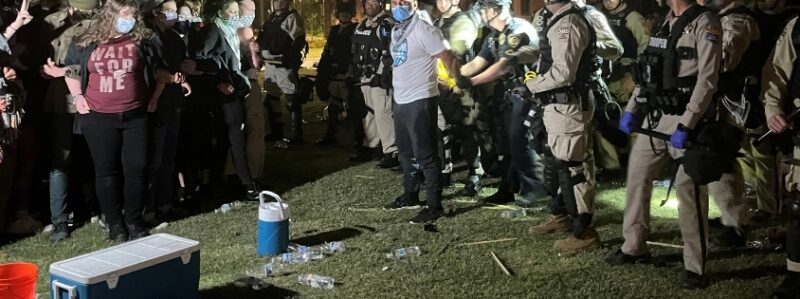ASU Student Gives Interview After Protest
In recent months, protests at universities across the country have increased in frequency and intensity, as tensions over the Israel-Hamas conflict continue to flare. These demonstrations have often been led by student groups in support of Hamas, the Palestinian militant organization, and have been met with mixed reactions from university administrations.
One trend that has emerged in these protests is the disruption of graduation ceremonies. This tactic was recently used at Arizona State University (ASU), causing disruption and confusion for students and their families. The protests have also resulted in legal action, with 20 students attempting to sue the school for disciplinary action taken against them.
Many of these protests have been covered by RedState, an online conservative news site. In a recent article, writer Bob Hoge described the protests as a "gang" that lacked individual thought or motivation. Journalists have also attempted to understand the rationale behind the protesters' actions, with little success.
In April, reporter Sarah Rumpf covered a similar incident at the University of Southern California, where the school chose to cancel its 2024 commencement ceremony due to threats of violence and antisemitic rhetoric from protesters.
WATCH: We spoke with ASU senior Breanna Brocker outside the courthouse, who said she will not be able to graduate because the suspension will cause her to miss her final exam pic.twitter.com/FKGaMuzOt7
— Ben Brown (@bdbrown473) May 4, 2024
ASU has not been exempt from these protests either. Attempts to set up "encampments" on campus have been met with swift action from police, resulting in the arrest of several protesters. Local TV coverage showed footage of students being removed from the encampments and arrested.
Recently, reporter Ben Brown from Phoenix's ABC affiliate interviewed one of these protesters, a senior named Emma Brocker. She was one of the 20 students who sued ASU after being suspended, banned from campus, and forbidden from communicating with professors. According to Brown, they lost the case, and as a result, these students are unable to complete their coursework or take final exams.
In the interview, Brocker admitted that she had just learned about the consequences of her actions and expressed frustration at not being able to communicate with her professors. However, when asked if she would do it all over again, Brocker's answer was a resounding yes. This attitude is reflective of the many protesters who have joined these movements without a full understanding of the cause they are supporting, as pointed out by RedState writer Brandon Morse.
ASU has remained steadfast in its response to the protests, not backing down from disciplinary action against the students involved. This has sparked a conversation about the role of universities in promoting free speech and expression while also maintaining order and protecting the safety of their students.
As graduation season continues, it remains to be seen if these protests will continue to disrupt ceremonies and cause legal issues for universities. However, the dedication and resilience of these student protesters show no signs of wavering, leaving the future of graduation ceremonies uncertain.


